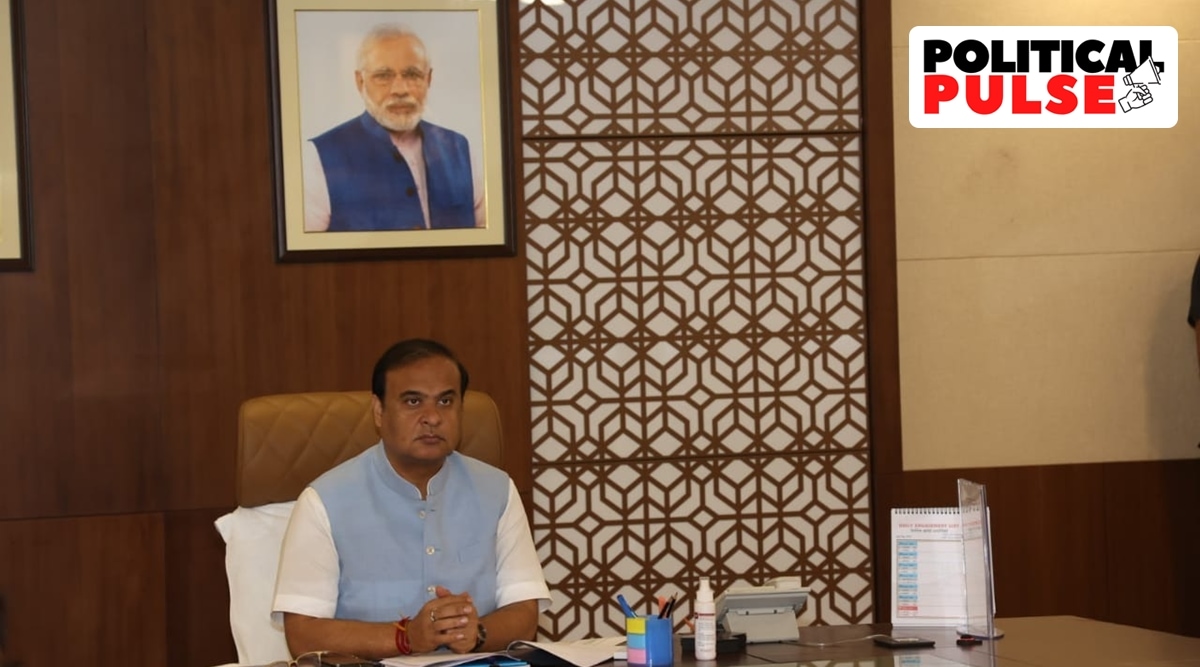 The panel was set up after CM Himanta Biswa Sarma's meeting with Assamese Muslims from various fields to discuss socio-economic challenges confronting the community (Twitter @himantabiswa)
The panel was set up after CM Himanta Biswa Sarma's meeting with Assamese Muslims from various fields to discuss socio-economic challenges confronting the community (Twitter @himantabiswa) An Assam government panel’s recommendation to identify Assamese Muslims as a distinct group has given rise to questions about whether it will benefit the community or fuel further division among Muslims, and what indigenous means in a state whose demography has been shaped by waves of migration over the decades.
Last week, the panel recommended the issuance of a notification and identity cards or certificates, and a census to “identify and document” the Assamese Muslim community. Considered distinct from Bengali-speaking Muslims who migrated from present-day Bangladesh, the “indigenous” Muslim community is divided into four main groups that claim to trace their origins in Assam to several centuries ago. These groups are the Goriyas and the Moriyas (from Upper Assam), the Deshis (from Lower Assam), and the Julha Muslims (from the tea gardens).
The panel was set up last July after Chief Minister Himanta Biswa Sarma’s meeting with Assamese Muslims from various fields — writers, doctors, cultural workers, lecturers, historians, and musicians, among others — to discuss socio-economic challenges confronting the community. The stated aim of Sarma’s outreach was the community’s welfare. In the meeting, he emphasised that the “uniqueness of the indigenous Assamese Muslims should be protected and preserved”.
Divided into seven sub-committees, the panel submitted its report on April 21. It also made suggestions on matters related to education, political representation, health, skill development, and women’s empowerment. Accepting the recommendations, the chief minister said they were “implementable” and added that the committee had also defined Assamese Muslims. “We have accepted the definition … now the target group will be clearer, and what work needs to be done for them,” he added.
Best of Express Premium
Some in the community see official recognition as a way to end their “identity crisis” as they are often confused with Bengali-speaking Muslims. BJP member Syed Muminul Aowal who heads the Janagosthiya Samannay Parishad (JSPA), an umbrella body of more than 30 “indigenous” organisations, said Assamese Muslims had the “same names as Bengali Muslims and are often clubbed with them”.
“Among the 1.3 core Muslims in Assam, Assamese Muslims are a minority. We barely have any political representation. A step like this will help indigenous Assamese Muslims benefit not just from Clause 6 but other schemes too,” said Aowal, who was earlier the chairperson of the Assam Minorities Development Board. He was referring to Clause 6 of the Assam Accord that grants “constitutional, legislative, and administrative safeguards” to the “Assamese people”.
Pointing out the fraught nature of an attempt to define “indigenous” in a state such as Assam, and the ambiguity of the term, All India United Democratic Front (AIUDF) legislator Aminul Islam said the panel’s proposals were part of a “political rhetoric” to “isolate Bengali Muslims further”.
“They want to bring yet another division among Muslims, that is why they are doing this. Till now, we do not have a base year to define who is an Assamese. More than that, there are many marriages between Assamese and Bengali Muslims. How does one identify such families?” he asked.
A Congress legislator, who did not wish to be named, agreed that the step was not good news for Bengali Muslims. “But it is also true that Assamese Muslims have long felt deprived of benefits and for them it is a good step. But yes, this will create a division and isolate Bengali Muslims even further,” he added.
Push for a census
A census for Assamese Muslims was first proposed in February 2020. After a meeting with the community’s members, then state Minorities Minister Ranjit Dutta confirmed plans to hold the census based on the 2019 Budget that had provisions for a “Development Corporation for Indigenous Muslims” for “holistic development” of the community as well as a “socio-economic census”.
There was no movement on the matter till April 2021 when Aowal’s JSPA, independent of the government, launched a website to conduct a census of Assamese Muslims “modelled on the lines of the National Register of Citizens (NRC)”. But the exercise did not take off.
Last week’s development shows the census may indeed be taken forward. The Congress legislator said there had been noise about various such efforts but it was a topic “no one wanted to touch, considering it was a hot potato”. “However, the chief minister is a shrewd politician and he knows this will help him politically,” he added.
Aowal said the recommendations were good but added they need to be reviewed. He added, “In its current form, the recommendations refer to identification for the ‘Assamese Muslim’ — but it is important that specific groups such as Goriyas, Moriyas, Deshis, and Julas are identified, considering the definition of indigenous is not clear.”
Islam said it would “ultimately not be implemented” since it was not “constitutionally legal” and warned that “damage would be done and further marginalise the Bengali Muslim community”.
State minorities minister Chandra Mohan Patowary said the whole idea was at the “recommendation stage” at present.
“The reports of the seven committees will be taken to the chief minister. After that, it will be discussed and he will give directions,” he said, adding, “Yes, he did say the recommendations were all implementable but he also added that it would be done in three phases — short term, medium term and long term — and matters would be taken (forward) accordingly.”
- The Indian Express website has been rated GREEN for its credibility and trustworthiness by Newsguard, a global service that rates news sources for their journalistic standards.

